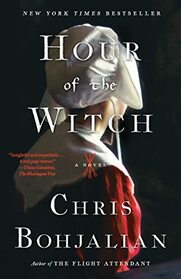Helpful Score: 2
Very engaging historical drama taking place in 1662 about a young woman in Puritanical Boston who is married to a husband who slaps and abuses her. Mary Deerfield is twenty-four years old and is the second wife of Thomas Deerfield who in a rage drives a three-tined fork into Mary's hand. Mary decides to try and divorce Thomas but many in the harsh community find fault with Mary and her divorce is settled in favor of Thomas. So Mary must go back to him but she has not given up hope. She had been accused of consorting with the devil when some forks, considered devil's tines by the Puritans, are found buried in her garden. She had also treated a dying boy with herbs but when he died some thought she and the devil had something to do with it. She wishes her husband dead but will she take the necessary steps to gain her freedom from him? Her actions and the accusations of others lead to her trial for witchcraft. Can she be saved?
Overall, I found this tale of life in Puritanical New England to be quite compelling. As usual, the novel included things I was unaware of and immersed the reader in life of the 17th century. I had to look up a few things including a cooking implement called a spider (which Thomas blamed on one of Mary's injuries). Turns out a spider is a frying pan with legs so it can be set directly over a fire.
Bohjalian created some very memorable characters for the novel and you really got a feel for the superstitions and prejudices of the Puritan culture of the time. I have read one other novel by him, The Double Bind which I also enjoyed so I'm sure I will be reading more of his works.
Overall, I found this tale of life in Puritanical New England to be quite compelling. As usual, the novel included things I was unaware of and immersed the reader in life of the 17th century. I had to look up a few things including a cooking implement called a spider (which Thomas blamed on one of Mary's injuries). Turns out a spider is a frying pan with legs so it can be set directly over a fire.
Bohjalian created some very memorable characters for the novel and you really got a feel for the superstitions and prejudices of the Puritan culture of the time. I have read one other novel by him, The Double Bind which I also enjoyed so I'm sure I will be reading more of his works.
Helpful Score: 1
Hour of the Witch has all the elements I love about Chris Bohjalian's books. The history is researched and real. Fascinating history aside, the book is at the same time fiction and tells a story that keeps me rapidly turning pages from beginning to the end. What I might expect of this book is the story of Puritan New England and a male dominated society. Yet, this book is really the story of the women - those who would tear each other down and those who would lift each other up.
Read my complete review at http://www.memoriesfrombooks.com/2022/02/hour-of-witch.html
Reviewed for NetGalley.
Read my complete review at http://www.memoriesfrombooks.com/2022/02/hour-of-witch.html
Reviewed for NetGalley.




